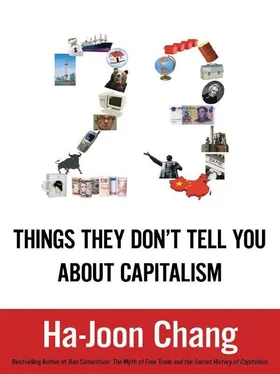This means that there has to be some minimum equality of outcome in terms of parental income, if poor children are to have anything approaching a fair chance. Without this, even free schooling, free school meals, free vaccinations, and so on, cannot provide real equality of opportunity for children.
Even in adult life, there has to be some equality of outcome. It is well known that, once someone has been unemployed for a long time, it becomes extremely difficult for that person to get back into the labour market. But whether someone loses her job is not entirely determined by the person’s ‘worth’. For example, many people lose their jobs because they chose to join an industry that looked like a good prospect when they first started but since has been hit hard by a sudden increase in foreign competition. Few American steelworkers or British shipbuilding workers who joined their industries in the 1960s, or for that matter anyone else, could have predicted that by the early 1990s their industries would be virtually wiped out by Japanese and Korean competition. Is it really fair that these people have to suffer disproportionately and be consigned to the scrapheap of history?
Of course, in an idealized free market, this should not be a problem because the American steelworkers and the British shipbuilders can get jobs in expanding industries. But how many former American steelworkers do you know who have become computer engineers or former British shipbuilders who have turned themselves into investment bankers? Such conversion rarely, if ever, happens.
A more equitable approach would have been to help the displaced workers find a new career through decent unemployment benefits, health insurance even when out of a job, retraining schemes and help with job searches, as they do particularly well in Scandinavian countries. As I discuss elsewhere in the book ( see Thing 21 ), this can also be a more productive approach for the economy as a whole.
Yes, in theory, a shoeshine boy from a poor provincial town in Peru can go to Stanford and do a PhD, as the former Peruvian President Alejandro Toledo has done, but for one Toledo we have millions of Peruvian children who did not even make it to high school. Of course, we could argue that all those millions of poor Peruvian children are lazy good-for-nothings, since Mr Toledo has proven that they too could have gone to Stanford if they had tried hard enough. But I think it is much more plausible to say that Mr Toledo is the exception. Without some equality of outcome (of parental income), poor people cannot take full advantage of equality of opportunity.
Indeed, international comparison of social mobility corroborates this reasoning. According to a careful study by a group of researchers in Scandinavia and the UK, the Scandinavian countries have higher social mobility than the UK, which in turn has higher mobility than the US. [65] M. Jäntti et al., ‘American exceptionalism in a new light: a comparison of intergenerational earnings mobility in the Nordic countries, the United Kingdom and the United States’, The Warwick Economic Research Paper Series, Department of Economics, University of Warwick, October 2005.
It is no coincidence that the stronger the welfare state, the higher the mobility. Particularly in the case of the US, the fact that low overall mobility is largely accounted for by low mobility at the bottom suggests that it is the lack of a basic income guarantee that is preventing poor kids from making use of the equality of opportunity.
Excessive equalization of outcomes is harmful, although what exactly is excessive is debatable. Nevertheless, equality of opportunity is not enough. Unless we create an environment where everyone is guaranteed some minimum capabilities through some guarantee of minimum income, education and healthcare, we cannot say that we have fair competition. When some people have to run a 100 metre race with sandbags on their legs, the fact that no one is allowed to have a head start does not make the race fair. Equality of opportunity is absolutely necessary but not sufficient in building a genuinely fair and efficient society.
Thing 21: Big government makes people more open to change
Big government is bad for the economy. The welfare state has emerged because of the desire by the poor to have an easier life by making the rich pay for the costs of adjustments that are constantly demanded by market forces. When the rich are taxed to pay for unemployment insurance, healthcare and other welfare measures for the poor, this not only makes the poor lazy and deprives the rich of an incentive to create wealth, it also makes the economy less dynamic. With the protection of the welfare state, people do not feel the need to adjust to new market realities, thereby delaying the changes in their professions and working patterns that are needed for dynamic economic adjustments. We don’t even have to invoke the failures of the communist economies. Just look at the lack of dynamism in Europe with its bloated welfare state, compared to the vitality of the US.
A well-designed welfare state can actually encourage people to take chances with their jobs and be more, not less, open to changes. This is one reason why there is less demand for trade protectionism in Europe than in the US. Europeans know that, even if their industries shut down due to foreign competition, they will be able to protect their living standards (through unemployment benefits) and get re-trained for another job (with government subsidies), whereas Americans know that losing their current jobs may mean a huge fall in their living standards and may even be the end of their productive lives. This is why the European countries with the biggest welfare states, such as Sweden, Norway and Finland, were able to grow faster than, or at least as fast as, the US, even during the post-1990 ‘American Renaissance’.
The oldest profession in the world?
Representatives of different professions in a Christian country were debating which profession is the oldest.
The medical doctor said: ‘What was the first thing that God did with humans? He performed an operation – he made Eve with Adam’s rib. The medical profession is the oldest.’
‘No, that is not true,’ the architect said. ‘The first thing he did was to build the world out of chaos. That’s what architects do – creating order out of chaos. We are the oldest profession.’
The politician, who was patiently listening, grinned and asked: ‘Who created that chaos?’
Medicine may or may not be the oldest profession in the world, but it is one of the most popular all over the world. However, in no country is it more popular than in my native South Korea.
A survey done in 2003 revealed that nearly four out of five ‘top-scoring university applicants’ (defined as those within the top 2 per cent of the distribution) in the science stream wanted to study medicine. According to unofficial data, during the last few years, even the least competitive of the country’s twenty-seven medical departments (at undergraduate level) has become more difficult to enter than the best engineering departments in the country. It cannot get more popular than that.
The interesting thing is that, even though medicine has always been a popular subject in Korea, this kind of hyper-popularity is new. It is basically a twenty-first-century phenomenon. What has changed?
An obvious possibility is that, for whatever reason (e.g., an ageing population), the relative earnings of medical doctors have risen and the youngsters are merely responding to changes in the incentives – the market wants more able doctors, so more and more able people are going into the profession. However, the relative incomes of medical doctors in Korea have been falling, with the continuous increase in their supply. And it is not as if some new government regulation was introduced that makes it difficult to get jobs as engineers or scientists (the obvious alternative choices for would-be medical doctors). So what is really going on?
Читать дальше






![Ally Carter - [Gallagher Girls 01] I'd Tell You I Love You But Then I'd Have to Kill You](/books/262179/ally-carter-gallagher-girls-01-i-d-tell-you-i-lo-thumb.webp)





